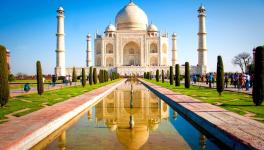Akhand Bharat or Fictional Union of South Asian States
Representational use only.
India’s Partition was one of the major tragedies, not just in South Asia but for the world. The causes for it can be traced to a dangerous triangle formed by the British policy of divide and rule combined with the belief of Hindu communalists in the primacy of a Hindu nation, and of Muslim communalists who were demanding the formation of a separate nation in the form of Pakistan.
The falsehoods that underpin the theory that religion can be the basis of a united nation-state were demonstrated by the breaking away of East Pakistan from Pakistan, which led to the formation of Bangladesh. The majority of Hindus and Muslims stood rock solid against this theory of religion as the basis of a nation-state. Just two representative names should suffice to prove this point: Maulana Abul Kalam Azad and Mohandas Karamchand Gandhi.
Hindu communalism held that India is a Hindu nation. Since Partition, many Hindu communalists have been holding that the breakaways from undivided India—Pakistan and Bangladesh—in particular, should be brought back to the Indian fold. This is the concept they call “Akhand Bharat”, or Unbroken India, based on “Hindu dharma”.
This was articulated in the speech of the RSS sarsanghchalak, Mohan Bhagwat, when he said “there is a need to become united again, not through force, but by Hindu dharma”. He also said, “They [the separated countries] did all they could, but did not find any remedy. And the only remedy is reunification [within Bharat] which will resolve all their problems.” It is important to note that the imagined reunification is, in Bhagwat’s view, to be done based on Hindu dharma.
Incredibly, the RSS holds that its idea of Akhand Bharat includes not only Pakistan and Bangladesh but also Afghanistan, Myanmar, Sri Lanka, and Tibet. It terms the combined region as a rashtra or nation based on Hindu cultural similarities.
At yet another level, Tripura’s Chief Minster Biplab Dev reported after attending a party meeting at Rabindra Satabarshiki Bhavan that the leaders of his party, the BJP, wanted to establish governments headed by their party in neighbouring countries after winning all states in India.
This is, in a way, falling back on the ideology of Hindu communalism that India and all of South Asia were from times immemorial, a Hindu nation. The reference to “Hindu dharma as the basis of unification” shows their real colours. They postulate that dharma cannot be translated into religion. Since both are different, the question arises, what is dharma? To the RSS and its ilk, it is the religiously-ordained duties.
Dharma includes “Khstriya dharma”, “stree dharma”, and so on, which suggest that the caste and gender roles assigned by tradition are also to be followed in the RSS’s Hindu rashtra ideal. Hinduism is indeed different from other religions but it is a religion all the same. It has deities (Brahma, Vishnu, Mahesh), it has rituals, it has holy books, clergy, and holy places. In practice, we have seen that most campaigns launched by Hindu nationalists have been around places of worship (Ram Temple), holy symbols (cow), and Hindu identity-related issues such as “love jihad”.
There are also claims that Hindutva is a way of life. All religions are unique and each also corresponds to a “way of life”. There is no reason why Hinduism cannot be a way of life and religion. However, the confusion between Hindutva and Hinduism needs to be understood. Hindutva is a political project, while Hinduism is a religion with multiple tendencies.
The concept of Akhand Bharat is hegemonic for it has at its base a religion, the RSS-projected version of Hindu dharma. We know that the effort to create a politics around religion led to India’s Partition. Besides, each country that the RSS aims to include within the ambit of Akhand Bharat has different religions.
This strikes at the root of the RSS theory that the Hindu religion would unify disparate countries that have their religions and ways of life. India, at least in theory, is a secular state, no religion lies at its foundation. Therefore, the statements of Bhagwat and company sound more like expansionism than collaborations with the world beyond India.
What the Sangh Parivar believes is the way forward for India and the world are not the only way. World over, there are attempts to establish peace and resolve global problems between nations. The United Nations, European Union, and SAARC are based on a collaborative model in areas of trade, commerce, education, and health. The idea is to respect the sovereignty of other nations and deal with them on a basis of equality.
None of these has religion at its foundation and yet they worked for peace and to enhance economic progress and social justice. Unfortunately, most of these initiatives have weakened over time. One thing to learn from these experiments is that when issues are addressed on concrete grounds of material cooperation, countries can come together and dissolve or set aside differences.
The path of claiming territories based on racial connection or religious ties has only had disastrous consequences on the world and its people. Besides, the claim that countries which parted ways from undivided India are distressed is based on a lopsided view. In many countries, including Pakistan and Afghanistan, the imperialist policies that sought to control global oil wealth wreaked havoc. Their problems cannot always be attributed to the religion of the people who live in them. Further, Bangladesh is currently on the path to progress and has left India behind on many development indicators.
South Asian countries can form a stronger federation based on equality and mutual respect for traditions and sovereignty. This can pave the way to a better economic and political atmosphere. To say there will be a “re-unification” with India as the hegemon will have the contrary effect on the region.
To wish for “Hindu dharma” the basis of this unification is domineering and exclusivist. What India needs is to strengthen its democratic ethos within, treat neighbors as friends and negotiate settlements peacefully. The crux of India’s association with its neighbours has to be commerce, trade, education, and health, and such a union will certainly enhance regional peace.
The author is a social activist and commentator. The views are personal.
Get the latest reports & analysis with people's perspective on Protests, movements & deep analytical videos, discussions of the current affairs in your Telegram app. Subscribe to NewsClick's Telegram channel & get Real-Time updates on stories, as they get published on our website.























